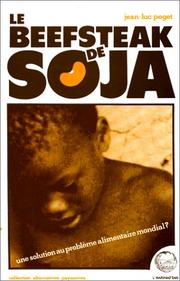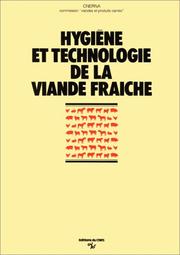| Listing 1 - 10 of 12 | << page >> |
Sort by
|
Book
ISBN: 9789057204753 Year: 2011 Publisher: Antwerpen Linkeroever
Abstract | Keywords | Export | Availability | Bookmark
 Loading...
Loading...Choose an application
- Reference Manager
- EndNote
- RefWorks (Direct export to RefWorks)
Book
ISBN: 0081023561 1785482483 9780081023563 9781785482489 9781785482489 Year: 2017 Publisher: London, UK Kidlington, Oxford
Abstract | Keywords | Export | Availability | Bookmark
 Loading...
Loading...Choose an application
- Reference Manager
- EndNote
- RefWorks (Direct export to RefWorks)
Meat substitutes. --- Meat alternates --- Substitutes for meat --- Food substitutes
Book
ISBN: 9782875421807 2875421808 Year: 2019 Publisher: Waterloo: Pire,
Abstract | Keywords | Export | Availability | Bookmark
 Loading...
Loading...Choose an application
- Reference Manager
- EndNote
- RefWorks (Direct export to RefWorks)
Depuis l’apparition de l’Homo sapiens il y a plus de 200 000 ans, notre espèce se nourrit de viande et les animaux ont satisfait cette demande. Mais avec la croissance de la population mondiale et sa consommation effrénée de viande, d'œufs, de produits laitiers, de cuir, etc., l'élevage intensif risque d’avoir un impact énorme sur la planète, la santé publique et sur les animaux eux-mêmes. Et si nous pouvions produire la viande autrement ? La viande dite « propre » (clean meat), une véritable viande obtenue grâce à la culture de cellules musculaires animales, pourrait être la solution. Avec une seule cellule provenant d’une vache, nous pourrions nourrir un village entier sans devoir recourir à l’élevage et à l’abattage d’animaux. Ce nouveau procédé pourrait révolutionner notre alimentation, rien de moins. Découvrez les dessous de cette course pour la création et la commercialisation d’une viande plus propre, plus sûre et plus durable. En allant à la rencontre d’entrepreneurs visionnaires, de scientifiques spécialisés dans l’ingénierie tissulaire ou encore de grands leaders du secteur alimentaire, l’auteur détaille cette quête pour une viande propre et expose le débat qu’elle suscite.
Meat substitutes --- Muscle proteins --- Cell culture --- Animal welfare
Multi
ISBN: 9780081023563 0081023561 1785482483 9781785482489 Year: 2017 Publisher: London, England ; Oxford, England : ISTE Press : Elsevier,
Abstract | Keywords | Export | Availability | Bookmark
 Loading...
Loading...Choose an application
- Reference Manager
- EndNote
- RefWorks (Direct export to RefWorks)
Nutritionary hygiene. Diet --- Food science and technology --- Meat substitutes.
Book
ISBN: 1529244358 Year: 2024 Publisher: Bristol, England : Bristol University Press,
Abstract | Keywords | Export | Availability | Bookmark
 Loading...
Loading...Choose an application
- Reference Manager
- EndNote
- RefWorks (Direct export to RefWorks)
Investigating climate-controlled agriculture and alternatives to animal proteins, John Wilkinson shows that trade and investment in agrifood is reorienting to the Global South. He skilfully illustrates the connections between social movements and technological innovation - and the need for consumer acceptance of new food habits.
Agriculture --- Crops and climate. --- Meat substitutes. --- Social aspects.
Book
ISBN: 9782356876553 2356876553 Year: 2019 Publisher: Latresne: Le bord de l'eau,
Abstract | Keywords | Export | Availability | Bookmark
 Loading...
Loading...Choose an application
- Reference Manager
- EndNote
- RefWorks (Direct export to RefWorks)
"Pour le bien des animaux, celui de la planète et pour préserver notre santé, il faudrait de toute urgence renoncer à l’alimentation carnée voire à tous les produits animaux et, en clôturant dix mille ans de vie commune avec les vaches et les brebis, librement consentir à une agriculture sans élevage. Après des décennies de silence médiatique et politique sur la violence industrielle contre les animaux, pourquoi cette soudaine prise de conscience ? C’est en reprenant le fil de l’industrialisation de l’élevage depuis le XIXe siècle et ses liens historiques avec la « cause animale » que l’on peut comprendre la situation actuelle et le développement des start-up de la « viande propre », amie des animaux et des milliardaires. La science et l’industrie, aujourd’hui comme hier, concoctent pour nous « un monde meilleur ». Sommes-nous bien sûrs qu’il correspond à nos désirs ?"
Animal welfare --- Animal culture --- Meat industry and trade --- Meat substitutes --- Dairy substitutes

ISBN: 2858022429 Year: 1982 Publisher: Paris : L'Harmattan,
Abstract | Keywords | Export | Availability | Bookmark
 Loading...
Loading...Choose an application
- Reference Manager
- EndNote
- RefWorks (Direct export to RefWorks)
Food supply --- Meat substitutes --- Soyfoods --- Soy-bean as food --- Soy foods --- Soybean as food --- Food --- Soybean products --- Meat alternates --- Food substitutes --- Vegetarianism --- Substitutes for meat
Film
Year: 2020 Publisher: London : Henry Stewart Talks,
Abstract | Keywords | Export | Availability | Bookmark
 Loading...
Loading...Choose an application
- Reference Manager
- EndNote
- RefWorks (Direct export to RefWorks)
This case study looks at two ways in which the economy can be adapted to address the challenges of climate change.
Artificial foods. --- Agricultural ecology. --- Agriculture --- Artificial food. --- Climate change mitigation. --- Environmental economics --- Global environmental change --- Green technology --- Meat substitutes. --- Sustainable agriculture. --- Environmental aspects. --- Economic aspects.

ISBN: 2222029538 9782222029533 Year: 1982 Publisher: Paris CNRS
Abstract | Keywords | Export | Availability | Bookmark
 Loading...
Loading...Choose an application
- Reference Manager
- EndNote
- RefWorks (Direct export to RefWorks)
Meat inspection --- Meat --- 637.51 --- Fresh meat. Meat substitutes --- Meat inspection. --- Meat. --- Agrotechnology and Food Sciences. Food Products --- Animal Products --- Meat and Meat Products --- Meat and Meat Products. --- 637.51 Fresh meat. Meat substitutes --- Inspection of meat --- Food adulteration and inspection --- Meats --- Food of animal origin --- Inspection
Book
ISBN: 0520968263 9780520295537 0520295536 9780520968264 Year: 2019 Publisher: Oakland, California
Abstract | Keywords | Export | Availability | Bookmark
 Loading...
Loading...Choose an application
- Reference Manager
- EndNote
- RefWorks (Direct export to RefWorks)
"In 2013, a Dutch scientist unveiled the world’s first laboratory-created hamburger. Since then, the idea of producing meat, not from live animals but from carefully cultured tissues, has spread like wildfire through the media. Meanwhile, cultured meat researchers race against population growth and climate change in an effort to make sustainable protein. Meat Planet explores the quest to generate meat in the lab—a substance sometimes called “cultured meat”—and asks what it means to imagine that this is the future of food. Neither an advocate nor a critic of cultured meat, Benjamin Aldes Wurgaft spent five years researching the phenomenon. In Meat Planet, he reveals how debates about lab-grown meat reach beyond debates about food, examining the links between appetite, growth, and capitalism. Could satiating the growing appetite for meat actually lead to our undoing? Are we simply using one technology to undo the damage caused by another? Like all problems in our food system, the meat problem is not merely a problem of production. It is intrinsically social and political, and it demands that we examine questions of justice and desirable modes of living in a shared and finite world. Benjamin Wurgaft tells a story that could utterly transform the way we think of animals, the way we relate to farmland, the way we use water, and the way we think about population and our fragile ecosystem’s capacity to sustain life. He argues that even if cultured meat does not “succeed,” it functions—much like science fiction—as a crucial mirror that we can hold up to our contemporary fleshy dysfunctions." -- Publisher's description.
Artificial foods. --- Engineered foods --- Fabricated foods --- Food, Artificial --- Substitutes for food --- Synthetic foods --- Food --- Food substitutes --- animals. --- capitalism. --- cultured meat. --- fake meat. --- farmland. --- food system. --- fragile ecosystem. --- future of food. --- generating meat in the lab. --- growing appetite for meat. --- hamburger. --- justice. --- lab created meat. --- lab grown. --- manufactured meat. --- meat. --- production. --- social and political. --- sustainable protein. --- sustaining life. --- vegan. --- vegetarian. --- Meat substitutes --- Artificial foods --- Meat industry and trade - Moral and ethical aspects --- Meat substitutes. --- Meat industry and trade --- Meat consumption --- Packing industry --- Food industry and trade --- Meat alternates --- Substitutes for meat --- Moral and ethical aspects.
| Listing 1 - 10 of 12 | << page >> |
Sort by
|

 Search
Search Feedback
Feedback About UniCat
About UniCat  Help
Help News
News